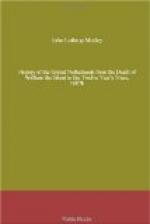The splendid victory of Heemskerk had struck the government with dismay and diffused a panic along the coast. The mercantile fleets, destined for either India, dared not venture forth so long as the terrible Dutch cruisers, which had just annihilated a splendid Spanish fleet, commanded by a veteran of Lepanto, and under the very guns of Gibraltar, were supposed to be hovering off the Peninsula. Very naturally, therefore, there was discontent in Spain that the cessation of hostilities had not originally been arranged for sea as well as land, and men said openly at court that Spinola ought to have his head cut off for agreeing to such an armistice. Quite as reasonably, however, it was now felt to be necessary to effect as soon as possible the recal of this very inconvenient Dutch fleet from the coast of Spain.
The complaints were so incessant against Spinola that it was determined to send Don Diego d’Ybarra to Brussels, charged with a general superintendence of the royal interests in the present confused condition of affairs. He was especially instructed to convey to Spinola the most vehement reproaches in regard to the terms of the armistice, and to insist upon the cessation of naval hostilities, and the withdrawal of the cruisers.
Spinola, on his part, was exceedingly irritated that the arrangements which he had so carefully made with the archduke at Brussels should be so contumaciously assailed, and even disavowed, at Madrid. He was especially irritated that Ybarra should now be sent as his censor and overseer, and that Fuentes should have received orders to levy seven thousand troops in the Milanese for Flanders, the arrival of which reinforcements would excite suspicion, and probably break off negotiations.
He accordingly sent his private secretary Biraga, posthaste to Spain with two letters. In number one he implored his Majesty that Ybarra might not be sent to Brussels. If this request were granted, number two was to be burned. Otherwise, number two was to be delivered, and it contained a request to be relieved from all further employment in the king’s service. The marquis was already feeling the same effects of success as had been experienced by Alexander Farnese, Don John of Austria, and other strenuous maintainers of the royal authority in Flanders. He was railed against, suspected, spied upon, put under guardianship, according to the good old traditions of the Spanish court. Public disgrace or secret poison might well be expected by him, as the natural guerdons of his eminent deeds.
Biraga also took with him the draught of the form in which the king’s consent to the armistice and pending negotiations was desired, and he was particularly directed to urge that not one letter or comma should be altered, in order that no pretext might be afforded to the suspicious Netherlanders for a rupture.




